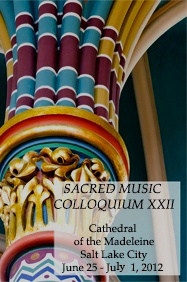I do use metrical vernacular hymns, but to me they are inferior to Gregorian chant, spritually and musically. They are not the text of the Mass, they are commentaries of individuals when they are used in Mass. Even if they are chosen by the most wise music director, they cannot surpass the chosen text by the Church.
English is a syllabic language, so it might fit better with the metered music. But metrical music cannot transcend like Gregoriant chant does. If a parish needs a commentary in Mass, I guess you need vernacular metrical hymns too. And if the parishioners are not familiar with Gregorian chant, I guess you have to use vernacular hymns. But there are also people who want to experience the liturgy without commentaries, the liturgy that trascends the time and space, which is supported by the music that highlights it.
"What active role did the apostles play at the Last supper? They let the astounding events enfold them, ...
"if I do not wash you, you have no part in me." (Mosebach, Heresy of Formlessness)
What part do we play in His sacrifice and how much commentaries do we need for His sacrifice?
I'd like to share the following I read recently. Even if you don't agree, it might help you to think twice before you promote vernacular metrical hymns in Mass. ( 'hymn' refers to vernacular hymn in the following quote, not hymns such as Gloria, Sanctus... )
"vernacular hymns have played significant part in the collapse of the liturgy. Just consider what resulted in the flowering of hymns: Luther's Reformation was a singing movement, and the hymns expressed the beliefs of the Reformers. Vernacular hymns replaced the liturgy, as they were designed to do; they were filled with the combative spirit of those dismal times and were meant to fortify the partisans. People singing a catchy melody together at the top of their voices created a sense of community, as all soldiers, clubs and politicians know. The Catholic Counter-Reformation felt the demagogic power of these hymns. People so enjoyed singing; it was so easy to influence their emotions using pleasing tunes with verse repetition. In the liturgy of the Mass, however, there was no place for hymns. The litrugy has no gaps; it is one single great canticle; where it prescribes silence or the whisper, that is where the mystery is covered with an acoustic veil, as it were, any hymn would be out of the question....
Still they were there: the sound of hundreds of people singing smothered the liturgy and obscured what was going on at the altar. It was clear that something needed to be done; but as we know, it was the hymns that were victorious, not the liturgy..."' (M. Mosebach)
Subscribe to:
Post Comments (Atom)

No comments:
Post a Comment